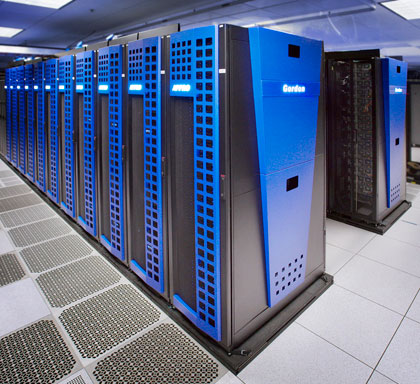News
SDSC Invites Researches to Apply for Access to Gordon Supercomputer
Published September 16, 2012
|
SDSC's Gordon Supercomputer. Photo: Alan Decker. |
The San Diego Supercomputer Center (SDSC) at the University of California, San Diego is seeking innovative applications for the next round of user allocations on its data-intensive Gordon supercomputer, which went into operation earlier this year.
Compute time on Gordon, the first high-performance supercomputer to use massive amounts of flash-based SSD (solid state drive) storage, is available through the National Science Foundation’s (NSF) Extreme Science and Engineering Discovery Environment, or XSEDE program. More information on the allocation process can be found on the XSEDE Allocations Overview webpage.
Applications for time on Gordon will be accepted during the one-month period starting September 15 and ending October 15. Awards will be announced following the December meeting of the XSEDE Resource Allocations Committee (XRAC), which consists of researchers and computational scientists who review the submissions and make allocation recommendations for all XSEDE resources. Compute time for this round of allocations is awarded for one year commencing January 1, 2013.
Gordon contains 300 TB (terabytes) of flash-based storage, similar to that found in smaller devices such as cellphones and laptops, but with greater performance and durability. Gordon also deploys large memory “supernodes” based on ScaleMP’s vSMP Foundation software. The standard supernode has approximately 1 TB of DRAM, but larger memory configurations can be deployed as needed. These features make Gordon an ideal platform for tackling data-intensive problems. Full specifications of SDSC’s Gordon, the result of a five-year, $20 million NSF grant, can be found online.
“Gordon is already assisting the research community in a wide range of data-intensive projects, many of which could not be addressed previously because scientists simply didn’t have the computer capability to do so,” said SDSC Director Michael Norman, principal investigator for the Gordon project. “We are looking to attract researchers who have innovative larger-scale research projects that will utilize Gordon’s unique capabilities.”
Gordon is designed for data-intensive applications spanning domains such as genomics, graph analysis, computational chemistry, structural mechanics, image processing, geophysics, and data mining applications. The system’s supernodes are ideal for users with serial or threaded applications that require significantly more memory than is available on a single node of most other high performance computing (HPC) systems, while Gordon’s flash-based I/O nodes may offer significant performance improvement for applications that exhibit random access data patterns or require fast access to significant amounts of scratch space.
In addition to the standard XSEDE allocation, SDSC is also inviting researchers to apply for dedicated use of Gordon’s flash I/O nodes for up to one year. This provides researchers with a platform for new types of data intensive applications, for example hosting community data resources that are closely integrated with compute nodes, or complex workflows where instrument or simulation data is staged on the flash nodes, and subsequently accessed for analysis and visualization. Dedicated I/O node allocations are processed through the XSEDE Start-Up allocation request, which can be turned around in a matter of a couple of weeks.
About SDSC
As an Organized Research Unit of UC San Diego, SDSC is considered a leader in data-intensive computing and all aspects of ‘big data’, which includes data integration, performance modeling, data mining, software development, workflow automation, and more. SDSC supports hundreds of multidisciplinary programs spanning a wide variety of domains, from earth sciences and biology to astrophysics, bioinformatics, and health IT. With its two newest supercomputer systems, Trestles and Gordon, SDSC is a partner in XSEDE (Extreme Science and Engineering Discovery Environment), the most advanced collection of integrated digital resources and services in the world.
For questions regarding Gordon allocations contact Robert Sinkovits at 858 822-0995 or sinkovit@sdsc.edu
Media Contacts:
Jan Zverina, SDSC Communications
858 534-5111 or jzverina@sdsc.edu
Warren R. Froelich, SDSC Communications
858 822-3622 or froelich@sdsc.edu
Categories
Archive
Related Links
San Diego Supercomputer Center: http://www.sdsc.edu/
UC San Diego: http://www.ucsd.edu/
XSEDE: https://www.xsede.org/


